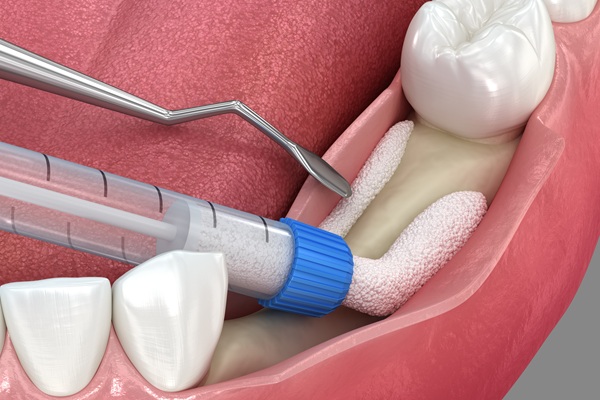Oral Surgeon Bone Grafting for Dental Implants FAQs

Bone grafting is a minor surgical treatment done under local anesthetic to replace depleted bone tissue. The grafting material may be inserted into a tooth socket just after a tooth is removed or at a location where a tooth has been absent for an extended period. Over the next few months, your body will produce new bone cells to replace the transplant material. Frequently asked questions about this procedure include the following.
Why is this treatment important before a dental implant procedure?
A dental implant is a permanent fixture and should remain in place for a lifetime. However, it must bond solidly to the jawbone for this to happen. Without enough bone volume, there is a risk of dental implant failure. When a tooth is lost, bone quality and quantity nearly always degrade, usually unnoticed.
It is possible that there will not be enough bone remaining to guarantee implant success by the time that a person chooses to get an implant. This is why the oral surgeon often recommends a bone grafting procedure. It is also why patients should replace a lost tooth as soon as possible and why many dentists propose a bone transplant after the extraction process.
What is the source of the grafting material?
It may originate from several places, including the patient’s body. That said, synthetic materials and laboratory-processed bone from a human or animal donor are now often utilized.
What is the risk of the grafting material?
Grafting material derived from the patient’s body poses no health risk. However, this procedure has a drawback because it necessitates the creation of a second surgical site where the bone material is sourced. Mineral bone alternatives, whether made from human or animal bone, represent a low danger of infectious disease transmission because they are thoroughly tested before use. Therefore, graft materials have been demonstrated to be exceedingly safe. Also, mineral transplant materials do not stay in the body but are absorbed and replaced gradually by the natural bone.
Is the process painful?
A tiny incision in the gum is made to reach the bone underneath it for bone grafting. As a result, the patient may suffer some discomfort after the operation. Most patients find that ice packs applied to the jaw and over-the-counter anti-inflammatory medicine and painkillers may help them manage their symptoms.
How long do healing and recovery take?
In a day or two, patients can return to their routine. However, the bone-regeneration process will have only barely started at this time. The body will keep regenerating new bone cells and eliminate the grafting material over the following months.
Is it possible for the body to reject the graft?
No, the body cannot reject the graft because it is made entirely of minerals and contains no living material. The only question is how much bone the body will produce due to the transplant. More grafting material may be added at the same time that the implant is put in if there is still not adequate bone by the time the graft has healed.
In conclusion
If you have more questions about bone grafting, book an appointment with the oral surgeon.
Request an appointment here: https://greatlakesos.com or call Great Lakes Oral Surgery at (734) 961-4864 for an appointment in our Ann Arbor office.
Check out what others are saying about our services on Yelp: Bone Grafting in Ann Arbor, MI.
Related Posts
Oral bone grafting procedures can help restore mouth functionality, health, and appearance. These surgical procedures vary in type and extent. Continue reading to learn more about dental bone grafts, the surgical grafting process, and why someone might need oral bone grafts.Surgeons perform bone grafts throughout the body. Oral bone grafting occurs in the mouth, usually…
Dental implants are the gold standard of dental replacements. Titanium rods and porcelain crowns are the most stable dental replacements you can get. Once osseointegration ends, you will have a strong, stunning smile again. Knowing the advantages of dental implants can motivate you to see your dentist about getting these restorations. Here are the three…
Full arch treatment offers a transformative solution for patients seeking complete tooth replacement. Unlike traditional dentures, this advanced procedure uses strategically placed dental implants to replace the upper and lower teeth permanently. Thus, it keeps the jawbone stimulated and recreates a natural-looking smile. Learning more about the many benefits of full arch treatment can help…
An oral surgeon can target problems in the jaw and mouth. There are cases when the most suitable solution for the patient’s jaw issues is jaw surgery. This procedure may seem scary, but the results will be worth it. Here are details that determine when your oral surgeon might recommend jaw surgery.Misaligned jaws are obvious.…
